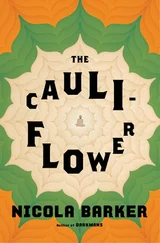In many ways this vulnerability made her much more endearing than she otherwise might be. She idealized some of the other hard-faced women that she knew who worked (in whatever capacity) in the fashion industry. At heart however she was just a big softy. Steve would often say this to her and would make it sound just about as complimentary as if she’d had bad breath. He’d put on a false Northern accent and say, ‘Oooh! Our Lisa, you’re a right big softy, you are,’ and chuck her on the chin ever so gently.
At the heart of Melissa’s character was a fundamental conflict, a paradox. Although she loved her life and what she had hitherto made of it — going to clubs with friends, knowing people who wrote for The Face , dropping names, spending money on clothes and, as Steve put it, ‘Having a laff’ — she felt as though at the centre of her life something very important was missing. There was a void, a space where her heart worked, a feeling of emptiness that she felt incapable of changing. She could be happy but never replete. The happiness came and went. It always depended on so much, and so much was random. She regularly wondered whether unhappiness — perhaps that is too strong a word for it — indifference, was simply a part of the human condition, the human make-up.
When she was fourteen she had tried to become a Catholic, wearing a crucifix and going to Mass. Eventually though, her fervour had faded and she’d laughed at herself and had felt foolish for wanting to belong. It was as though God, in his Catholic incarnation, had momentarily been an excuse, an alternative to sincerity or self awareness. God had not been Love, he had been a make-believe figure synonymous with passion and yet not passion. A cypher.
Whenever she concentrated too hard or too long on these dissatisfied thoughts — her inner sense of frustration and bewilderment — and became overwhelmingly maudlin as a consequence, Steve would take her out for a special lunch and have what he called ‘One of Our Serious Chats’.
Although he was fond of Melissa he firmly believed that she was misguidedly intense. To him she seemed like a person caught in some sort of moral breakdown; as if there had been a kind of mental short circuit between her desires and her will. It was a complex idea but he endeavoured to explain it to her. He’d say, ‘Think of it this way, Melissa. It’s as though you are guided by a very strict and orthodox moral scheme, well, not so much guided because you don’t act on it. I mean, it’s as if your personality has been formed in a very precise way — you have a clear, lucid idea of right and wrong — yet nothing in your behaviour exhibits this belief. You are sincere, but your life isn’t.’
Invariably Melissa would pick at her side salad and look confused. Eventually Steve would talk himself into circles and by the end of the meal he’d be saying, ‘God, my life’s such a mess. I’m so frivolous, just a bundle of pretentions and intentions. Ignore everything I’ve said. Have fun!’
At the mention of fun Melissa’s heart would sink and she’d wonder if she could ever be happy. Steve would pay the bill and wonder whether he’d end up joining the Moonies.
The morning after his appointment at the hospital was a Tuesday. John resolved to phone in sick and take the day off work to sort himself out. He panicked at the idea of leaving work altogether though, because the days and weeks ahead of him were like an empty beach and his tide was coming in ever so surely but ever so slowly.
After telephoning he put on a jacket and picked up his letters. He wanted to post them straight away. He’d decided over breakfast that it must be easier to die if a selected number of people knew about it in advance. He hated the idea of keeping the knowledge of his illness inside him like an internal bruise, invisible but painful. He wanted a talking cure, or at least a talking cessation.
Because the weather was relatively fine he decided to walk a longer route to the post office. On his way he passed a school and two churches. As he passed by them he thought, ‘I’ll never be able to have children of my own. I’ll not know God before I die. I won’t come to terms with my life. I won’t grow older and wiser and resigned.’
By the time he’d reached the Post Office he had listed fifty-seven things that he would never be able to do. He stood in the queue and touched the partition rope with the tips of his fingers, deep in thought. In front of him were several old women and a couple of old men. It was pension day. He thought, ‘I’ll never collect my pension.’
He tried to cheer himself up by thinking, ‘Maybe everyone has lists of things they’ll never do with their lives. In my case I just have a shorter time to compile my list. Some people have long, empty lives and all they ever do is to think about what it is that they haven’t done.’
Even so, his eyes felt wet. The line was gradually getting shorter. In front of him most people were watching the larger television advertising screen at the front of the queue which spouted out adverts for life insurance and special stamp collecting deals. John watched the screen and tried not to think.
After a few minutes the screen went blank and the words DEATH WITH DIGNITY appeared in bold, square, white letters. The image of a sad old woman emerged out of the blackness; she stared out at the queue with a desperate expression. She had dying eyes. John thought, ‘I wonder if my eyes look like that now.’
A disembodied voice came out of the television. It said, ‘Do you want to be a burden on your friends, family and loved ones when you die? No? Well then, why not prepare in advance?’ Again DEATH WITH DIGNITY emerged over the image of the old woman. The letters sucked all colour from the screen and shrouded themselves in a funeral black backdrop.
John said the words to himself and they sounded so corny when he said them, like some silly, rhyming cliché coined to encapsulate the situation he now faced. They made him feel cheap and stupid.
The words faded again and the old woman’s face reappeared. As her face came into focus this time, however, it broke into a smile. The camera moved to concentrate on her hand. In it she held a document. At the top of the document were the words DEATH WITH DIGNITY. Again the disembodied voice said, ‘Why not prepare in advance? Pay for your funeral now, make your own choices, and we will deal with it in the future. Pick up a leaflet at the counter.’
A shutter came down inside John’s head. He felt a sense of enormous negative power, an annihilating vigour. The next thing he knew he was out in the sunshine again and the letters were in his pocket, unstamped, unposted.
He stood still awhile, his head tilted towards the watery sun which shone on to his face and felt almost as though it had ironed out all the creases in his expression, all the lines and tiny crinkles. His first comprehensible thoughts were, ‘It’s not going to be like that for me. I’m not going to invest in my death as though it were simply another item, another purchase to be mulled over and paid for. It has to mean more than that.’
In the back of his mind he knew that his reaction was incoherent, almost hypocritical. A tiny mental shiver, an impulse, pumped in the rear of his brain which said, ‘You’ve lived your thirty-four years this way, why not die this way too? Buy something, feel happy. Look at the options, make a decision, complete the deal. It’s that simple.’
He turned his face from the sunlight and looked down at his hands which were clean and smooth with oval nails, pinky-brown and still strong. As he moved his fingers they tingled and he wondered how long he would be able to move them completely. He didn’t know. He placed his hand in his pocket and felt the letters inside, then he felt for his wallet and got it out. Slowly an idea gelled together in his mind which made his stomach convulse and quiver with unease and excitement. He thought, ‘That’s it! I’m going to do it myself this time, I’m going to cut out the middleman just this once and create something that is truly individual.’
Читать дальше
Конец ознакомительного отрывка
Купить книгу












